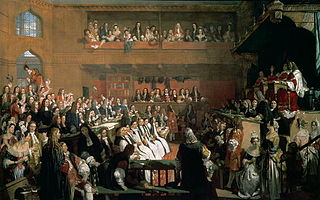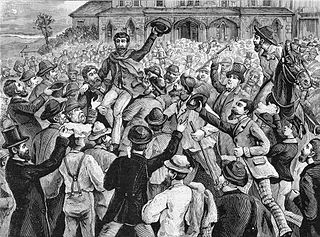Related Research Articles
In jurisprudence, double jeopardy is a procedural defence that prevents an accused person from being tried again on the same charges following an acquittal or conviction and in rare cases prosecutorial and/or judge misconduct in the same jurisdiction. Double jeopardy is a common concept in criminal law – in civil law, a similar concept is that of res judicata. The double jeopardy protection in criminal prosecutions bars only an identical prosecution for the same offence except when the defendant is a servicemember as the courts have ruled that the military courts are a separate sovereign, therefore servicemembers can be held in two separate trials for the exact same charges; however, a different offence may be charged on identical evidence at a second trial. Res judicata protection is stronger – it precludes any causes of action or claims that arise from a previously litigated subject matter.

A jury trial, or trial by jury, is a legal proceeding in which a jury makes a decision or findings of fact. It is distinguished from a bench trial, in which a judge or panel of judges makes all decisions.
In law, a plea is a defendant's response to a criminal charge. A defendant may plead guilty or not guilty. Depending on jurisdiction, additional pleas may be available, including nolo contendere, no case to answer, or an Alford plea.

Jury nullification, also known in the United Kingdom as jury equity, or a perverse verdict, is when the jury in a criminal trial gives a verdict of not guilty even though they think a defendant has broken the law. The jury's reasons may include the belief that the law itself is unjust, that the prosecutor has misapplied the law in the defendant's case, that the punishment for breaking the law is too harsh, or general frustrations with the criminal justice system. Some juries have also refused to convict due to their own prejudices in favor of the defendant. Such verdicts are possible because a jury has an absolute right to return any verdict it chooses. Nullification is not an official part of criminal procedure, but is the logical consequence of two rules governing the systems in which it exists:
- Jurors cannot be punished for passing an incorrect verdict.
- In many jurisdictions, a defendant who is acquitted cannot be tried a second time for the same offense.

In common law jurisdictions, an acquittal means that the prosecution has failed to prove that the accused is guilty beyond a reasonable doubt of the charge presented. It certifies that the accused is free from the charge of an offense, as far as criminal law is concerned. The finality of an acquittal is dependent on the jurisdiction. In some countries, such as the United States, an acquittal prohibits the retrial of the accused for the same offense, even if new evidence surfaces that further implicates the accused. The effect of an acquittal on criminal proceedings is the same whether it results from a jury verdict or results from the operation of some other rule that discharges the accused. In other countries, like Australia and the UK, the prosecuting authority may appeal an acquittal similar to how a defendant may appeal a conviction — but usually only if new and compelling evidence comes to light or the accused has interfered with or intimidated a juror or witness.

Res judicata or res iudicata, also known as claim preclusion, is the Latin term for judged matter, and refers to either of two concepts in common law civil procedure: a case in which there has been a final judgment and that is no longer subject to appeal; and the legal doctrine meant to bar relitigation of a claim between the same parties.
Prejudice is a legal term with different meanings, which depend on whether it is used in criminal, civil, or common law. In legal context, prejudice differs from the more common use of the word and so the term has specific technical meanings.
Nolle prosequi, abbreviated nol or nolle pros, is legal Latin meaning "to be unwilling to pursue". It is a type of prosecutorial discretion in common law, used for prosecutors' declarations that they are voluntarily ending a criminal case before trial or before a verdict is rendered; it is a kind of motion to dismiss and contrasts with an involuntary dismissal.

The Criminal Justice Act 2003 is an Act of the Parliament of the United Kingdom. It is a wide-ranging measure introduced to modernise many areas of the criminal justice system in England and Wales and, to a lesser extent, in Scotland and Northern Ireland. Large portions of the act were repealed and replaced by the Sentencing Act 2020.
The doctrine of direct estoppel prevents a party to litigation from relitigating an issue that was decided against that party. Direct estoppel and collateral estoppel are part of the larger doctrine of issue preclusion. Issue preclusion means that a party cannot litigate the same issue in a subsequent action. Issue preclusion means that a party in a previous proceeding cannot litigate an identical issue that was adjudicated and had the judgment as an integral part of the overall issue.
United States v. Oppenheimer, 242 U.S. 85 (1916), was a landmark Supreme Court decision applying the common law concept of res judicata to criminal law cases.
Heath v. Alabama, 474 U.S. 82 (1985), is a case in which the United States Supreme Court ruled that, because of the doctrine of "dual sovereignty", the double jeopardy clause of the Fifth Amendment to the Constitution does not prohibit one state from prosecuting and punishing somebody for an act of which they had already been convicted of and sentenced for in another state.
The Double Jeopardy Clause of the Fifth Amendment to the United States Constitution provides: "[N]or shall any person be subject for the same offence to be twice put in jeopardy of life or limb..." The four essential protections included are prohibitions against, for the same offense:

Connelly v DPP [1964] AC 1254 was a landmark appeal whereby the highest court set out the way in which peripheral double jeopardy trials can take place in British law. It was ruled such proceedings should only be stayed where a retrial would be an abuse of process that violated objective standards of fairness and hampered the rights of the defendant. Connelly had been tried for murder, while in the commission of a robbery, and was found guilty despite a defence revolving around a lack of intent for murder. Connelly then appealed to the Court of Appeal, where his conviction was overturned and he was acquitted of murder for lack of proveable intent to kill or cause serious injury at the moment or leading up to the killing and the indictment reduced to robbery. Connelly pleaded autrefois acquit, or double jeopardy, but the argument was rejected and he was able to be convicted of robbery. It is ruled that offences of murder and robbery differ enough in fact and in law" that charges for both offences must together fall or stand. The moral sphere in which law founded demands in that the public interest that robbers do not go without a sentence by way of justice.
Ludwig v. Massachusetts, 427 U.S. 618 (1976), was a case in which the Supreme Court of the United States held that the Massachusetts two-tier court system did not deprive Ludwig of his U.S. Const., Amend. XIV right to a jury trial and did not violate the double jeopardy clause of the U.S. Const., Amend. V.

The United States Constitution contains several provisions regarding the law of criminal procedure.
North Carolina v. Pearce, 395 U.S. 711 (1969), is a United States Supreme Court case that forbids judicial “vindictiveness” from playing a role in the increased sentence a defendant receives after a new trial. In sum, due process requires that a defendant be “free of apprehension” of judicial vindictiveness. Time served for a new conviction of the same offense must be “fully credited,” and a trial judge seeking to impose a greater sentence on retrial must affirmatively state the reasons for imposing such a sentence. The companion case, Simpson v. Rice, was identical except that the defendant initially pleaded guilty and received only one trial after withdrawing that plea. Simpson was later overruled in Alabama v. Smith.

The Criminal Law Act 1827 was an act of the Parliament of the United Kingdom, applicable only to England and Wales. It abolished many obsolete procedural devices in English criminal law, particularly the benefit of clergy. It was repealed by the Criminal Law Act 1967.
Blueford v. Arkansas, 566 U.S. 599 (2012), was a decision of the Supreme Court of the United States that clarified the limits of the Double Jeopardy Clause. The Supreme Court held that the Double Jeopardy Clause does not bar retrial of counts that a jury had previously unanimously voted to acquit on, when a mistrial is declared after the jury deadlocked on a lesser included offense.
Burks v. United States, 437 U.S. 1 (1978), is a United States Supreme Court decision that clarified both the scope of the protection against double jeopardy provided by the Fifth Amendment to the United States Constitution and the limits of an appellate court's discretion to fashion a remedy under section 2106 of Title 28 to the United States Code. It established the constitutional rule that where an appellate court reverses a criminal conviction on the ground that the prosecution failed to present sufficient evidence to prove the defendant's guilt beyond a reasonable doubt, the Double Jeopardy Clause shields the defendant from a second prosecution for the same offense. Notwithstanding the power that appellate courts have under section 2106 to "remand the cause and direct the entry of such appropriate judgment, decree, or order, or require such further proceedings to be had as may be just under the circumstances," a court that reverses a conviction for insufficiency of the evidence may not allow the lower court a choice on remand between acquitting the defendant and ordering a new trial. The "only 'just' remedy" in this situation, the Court held, is to order an acquittal.
References
- ↑ 14B Michie's Jurisprudence, Pleading § 45 (1988).
- 1 2 Rogers v The Queen (1994)
- 1 2 Pearce (1998) 194 CLR 610 [53]-[54].
- ↑ Michelle Heeley (25 June 2013). "Double jeopardy" (PDF). Archived from the original (PDF) on 19 October 2018. Retrieved 18 October 2014.
- ↑ "Criminal Justice Act 2003, Part 10". UK Government. 20 November 2003. Retrieved 18 October 2014.
- ↑ Black's Law Dictionary, 4th ed. 1968, p. 1310, citing Rawson v. Knight, 71 Me. 102; Wilson v. Knox County, 132 Mo. 387, 34 S.W. 45.
- ↑ Black's Law Dictionary, 4th ed. 1968, p. 1311, citing Gould, Pl., c.2, § 38.